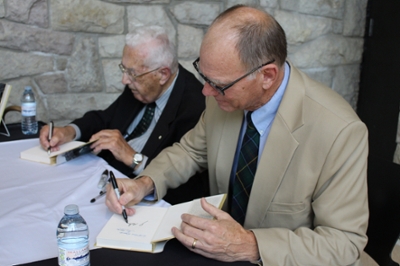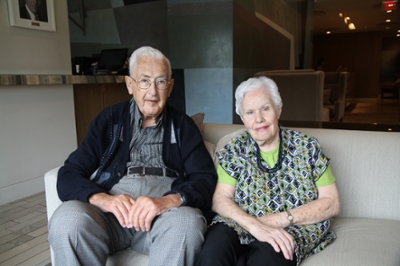
The mighty Hughes returns
As the leading institution in Canada for building reconciliation, it was a natural fit for the University of Saskatchewan to host one of Canada’s foremost advocates in the court systems concerning colonization.
By Lindsay Royale
Alumnus of Influence Ted Hughes (BA’48; LLB’50) and author Craig McInnes visited the College of Law for a book signing and public talk as part of the U of S Canada 150 Book Series. The biography, The Mighty Hughes: From Prairie Lawyer to Western Canada’s Moral Compass, details the life and career of Hughes, and as the title implies, there is no space for mediocrity between its pages.
Hughes’ career has spanned an impressive 60 years in the Canadian judicial system. As a respected senior judge in Saskatchewan, and as deputy attorney general and conflict of interest commissioner for British Columbia and the Northwest Territories, Hughes earned a reputation as someone who would deliver the right resolution. Noted for defending principles that underpin the best of our society, his career carried the weight of mending unethical politicians; advocating for children in care; defending equal rights for women in the legal system; and drawing attention to what Hughes believed were the disastrous effects of colonization on Indigenous people.
When asked about the grandiosity of the title—of his life—his response is, unsurprisingly, fair. “I never felt any pressure with the moral compass designation because I’ve always enjoyed my work,” he says. “Any judge that has the ability to take away the freedom of his fellow citizens understands that that is a pretty onerous piece of responsibility that no judge takes lightly.”
Mighty Hughes touches on a moment of great impact for the legal legend—a day in court that redefined his understanding of the legal system.
Hughes was presiding over a murder case where the defendant was taking the stand in his own defence. It was apparent, Hughes recalls, that the defendant was very frustrated with the process.
“I asked him if he would like to voice what was bothering him,” he explained. Hughes said the man’s words hit him hard as he explained that within his own culture, the offence he was accused of would not have been dealt with in the same manner as in the “white man’s court.”
“It made me realize what a difference it had made in the lives of these people to have the European system thrust upon them by the settlers as they had arrived. I came home that day and told Helen (Hughes’ wife) about this experience, and that she should get involved and see what could be done to ease the road for the Aboriginal community who had their culture taken away from them,” Hughes explained. “Of all my time in the court room, 18 years, that was the day that stands out in my mind that I had to rethink my whole objectivity on that issue.”
The case also served as the catalyst for his wife, Helen Hughes (BSHEC’54), to go into politics and for the couple to become advocates for Indigenous matters. Helen went on to join City Council and the two worked together in their respective areas of influence to create change and raise awareness of the effects of colonialism in the community. Hughes believes progress is being made, but that there are still improvements needed to help the Indigenous community, particularly when navigating the judicial system.
“Lots of good is going on in universities and education, but our prisons are disproportionality represented and the number of children taken into care from Aboriginal families has not moved since the ‘60s,” Hughes said. “There are some wonderful long-term things taking place but I’m concerned for the short term and the suffering that is going on for Aboriginal peoples.”
Now in their late 80s and early 90s respectively, Helen and Ted are still advocating for change in their communities and encourage students in higher education to consider how their influence in the world can enact change. “Educate yourself. Become qualified in some way. I could have never done what I had done without getting that paper from the university. Stick with it—it’s worth it at the end of the road,” he said.
Proceeds from Mighty Hughes are being donated to the Ted and Helen Hughes Prize for Excellence scholarship fund, which was established to recognize and reward a Juris Doctor or Masters of Law student for their work concerning Indigenous children or youth and the law.

